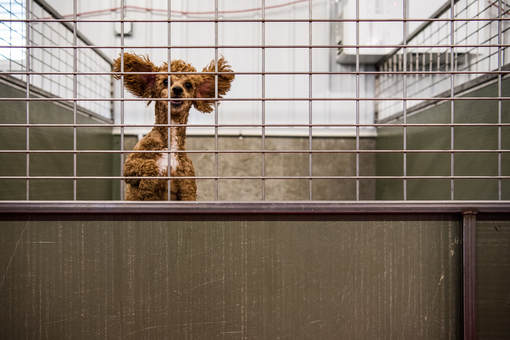|
When you hear the word “auction,” what image comes to mind? Real estate? Cars? Antiques? Art? Livestock? eBay? How about dogs? Yes. Dogs. Dog auctions are big business in our country and as I blogged about in both 2016 and 2017, some of the biggest customers are people from the animal rescue community. Although many rescuers are quick to criticize people who buy animals in pet stores, they see no issue with cutting out the middleman and going straight to the source. There was a time years ago when rescuers could get former “breeder stock” who were no longer profitable, and who otherwise would have been destroyed, for free. One of the most famous faces in the fight against “puppy mills” and irresponsible breeders is Harley Taylor, the little dog who was rescued after having literally been left in a bucket to die. At around this time, rescuers could get some of the breeder stock slated for auction, but in the very worst shape, for some nominal amount. I have been told about dollar dogs or a deal to sell 50 dogs for three dollars. Yes. Three dollars. The inspiration for National Mill Dog Rescue was a dog named Lily Strader who was purchased at an auction for $20 in 2007. Fast forward to present day and all of that has changed. It changed not so much because the commercial dog breeding industry itself changed, but because of a new buyer at auctions: well meaning rescuers who are so bound and determined to “rescue” or “save” dogs from auctions that they are willing to pay whatever it takes to get dogs, sometimes spending hundreds or thousands on dogs who in prior years would have sold for a fraction of that cost. I am unapologetic in my criticism from people in the rescue community who buy dogs at auction and pay anything more than some nominal amount that may cover the cost of lunch or a tank of gas. A sale is a sale is a sale. I will not revisit my earlier blogs here other than to state one basic fact: while it may seem noble to buy a dog at auction and call it rescue, doing so is incredibly short sighted because it only serves to perpetuate the very industry we all claim to abhor. Yes, that one dog may go on to lead a great life. But that one dog will be replaced by at least one (if not many more) dogs we do not see. And so the industry continues, driven by pricing and demand created by rescuers. One of the first publications to cover this topic was Kim Kavin’s book, “The Dog Merchants” which was published in May of 2016. I am pleased to share that Kim continued her extensive research to go beyond her book and that the efforts of 18 months have come to light for all the public to see and read in the Washington Post Article entitled, “Dog Fight: Dog rescuers, flush with donations, buy animals from the breeders they scorn.” I encourage you to read the article for yourself and then give some serious thought to the whole subject of rescuers at auction. Kim was gracious enough to spend some time to help me blog on this topic and about her article. I hope you find the Q&A informative. (A poodle dog is seen jumping at the Sugarfork Kennels on Wednesday, March 7, 2018, in Goodman, Mo. Photo credit: Salwan Georges/The Washington Post) Your article sets forth facts and evidence which could be interpreted as evidence of criminal behavior by individuals and rescuers. Do you expect any criminal charges to be filed and, if so, how would that come about? What we did with this article is shine a light on a practice that most everyday dog lovers don’t realize is happening, pulling back the curtain on the fact that dog auctions exist and that some rescuers are going there to buy dogs alongside the breeders. Those basic facts, alone, have been a revelation to many dog lovers, based on the comments I’ve seen around the Internet and what I’ve heard from even my own friends and family. We achieved our goal of documenting the fact that this business model is happening in the world of rescue, and that it is widespread, with the rescue and advocacy groups and shelters that we tied to auctions now operating nationwide and into Canada. Now that we have presented the information, how other people choose to use that information, well, that is up to them. Your article makes it sound as though many rescuers have now taken the place of USDA licensed brokers because they buy dogs at auction and then sell them to the public using the phrase "adoption fee." Is this a fair assessment? I think the line in the story that speaks best to that question is this one: “The breeders call ‘retail rescuers’ hypocritical dilettantes who hide behind nonprofit status while doing business as unregulated, online pet stores.” That line was written based on what our reporting showed. Several of the breeders we quoted in the story are USDA licensed and, thus, know how brokers operate. It’s interesting to me that you homed in on that point. So did the Best Friends Animal Society, on its blog, where the Best Friends writer stated: “Breeders refer to these rescuers as ‘hypocritical dilettantes who hide behind nonprofit status while doing business as unregulated, online pet stores.’ It’s hard to argue with that observation while more than 4,100 dogs and cats are still being killed in our nation’s shelters every day.” In my experience, most people who donate to rescue groups knowing full well that they plan to buy dogs at auction think they are doing a good thing. They believe that they are helping rescues save dogs from lives of misery and servitude. What would you say to those people to persuade them that these purchases actually enrich the industry? We do use the word "enrich" in the article. The editors and I discussed, debated and ultimately decided to use that word based on our reporting. We believe our reporting supports it. For some of that reporting, I’d point readers to the quote from Southwest Auction owner Bob Hughes, in the sidebar Q&A, that I think speaks most directly to the way that you asked your question: “I think rescuers do help drive up the prices — but all bidders help. The $18,000 and $12,600 dogs that we broke records selling in February, they didn’t go to rescue. To say that rescuers don’t help the prices, though, would be wrong. . . . Every single person that attends an auction is driving the price up. And if . . . the breeder is determined to get the dog, and the rescue is equally determined to get the dog, that’s going to drive the price.” I’d also point readers to that same Q&A, to the interview with the owner of the Heartland auction, who said: “Prices paid by rescues are higher now. The rescuers come in here with more money than the breeders. … The principle of what’s happening with the rescues is the same at our place as at Southwest, but the prices aren’t the same.” I know of rescuers in my state who travel hundreds of miles to buy dogs at auction while turning a blind eye to the dogs in shelters near them who need to be rescued to stay alive. Is this behavior typical as far as you know? It’s interesting to me that you are asking about that underlying debate within the rescue community, because again, the Best Friends Animal Society did the same thing in its blog. This was the take that Best Friends had on it: “Would it surprise you to learn that the rescue group that purchased the two Cavaliers for $10,000 each is located in Alabama, the state with the third highest number of shelter animals killed annually? Or that the rescue group that purchased the pregnant Frenchie is located in Texas, the state that tops the shelter killing list? Texas kills an estimated 232,000 shelter pets per year and this Texas ‘rescue group’ is buying pregnant dogs from breeders at auctions in Missouri. This is not rescue, this is enabling abuse.” My contacts have told me that the presence of rescuers at auction has completely changed the industry because of their willingness to pay whatever it takes to buy certain dogs. Would you agree? Our reporting included some quotes from breeders who said, “We have breeders that breed for the auction,” and, “A breeder friend of mine said she’s thinking about saving her puppies until they get about a year old and take them to the auction. The rescue people will pay more than the pet-store brokers.” And then in the sidebar Q&As with the auction owners, Hank Grosenbacher, the owner of Heartland, said: “I did have an out-of-state breeder tell me he has heard breeders say, ‘Well shoot, we’ll just start raising dogs and take them to Southwest and sell them to the rescues for high dollars. We’ll just breed for the rescues.’” But it wasn’t only breeders and an auction owner giving us that information. It was also some rescuers. I would point people to the video at the very top of the story, to click “play” right below the headline, where they can see a rescuer—one who knows the commercial-breeding industry well—say very plainly that things have changed in recent years, and that today, “The industry understands that rescue is a piece of the business of the auction.” That rescuer also did a phone interview with me, and she said a similar thing, about rescuers paying high dollar amounts for auction dogs: “They’re creating an industry inside the industry.” I understand your investigation for the article took 18 months and was more work than your research for your book, “The Dog Merchants.” What shocked you most about the results of your investigation? To be honest, I’m most shocked that it happened at all, that an industry insider read “The Dog Merchants” book, felt I was honest and fair in the reporting, and started sending me all these auction invoices and other documents. It’s quite a thing, to have all of that documentation show up in your inbox. The result is that this story is the first time that anyone has ever documented—in dollars and cents—the multimillion-dollar river of cash that is flowing from rescue nonprofits, shelters and dog-advocacy groups through auctions into the pockets of dog breeders. That’s pretty shocking, too, that we were able to shine a light in such a substantive way. I heard that one of the most profitable auctions by Southwest Auction Services in Wheaton, Missouri, was held in early February. I'm told a record was set regarding the amount of money spent by rescuers and the amount spent for a single dog. Do you have any information about that? That sale in early February 2018, according to Southwest’s owner, was his most successful dog auction ever. He sold more than $600,000 worth of dogs, and a breeder paid the highest price ever for a dog at Southwest: $18,000 for a Miniature/Toy Poodle. The top price that a rescue-affiliated buyer paid at that same auction was $8,750 for a pregnant French Bulldog. Readers can see that invoice for the $8,750 Frenchie right on The Washington Post’s website, along with a graphic drawn from other documents we have showing other prices that numerous rescuers have paid for various breeds at the auctions on other dates. Some of the comments made by Bob Hughes make it seem like he has a certain degree of disdain for many rescuers (even though they help his business remain profitable) at worst and marvels at their behavior at best. Is that a fair assessment? I think there are two quotes in the story from Bob Hughes where he answers your question for himself, and he where he is clear about his beliefs regarding rescuers. We used one in the main story, where he states: “I honestly think there are very good, responsible rescues that just love the dogs and want to get them out of the breeding industry. And I think there are malicious, lying, cheating rescues that are in it for the money and the glory and the funding.” Then in the Q&A sidebar, we used a quote from a phone interview that I did with Bob Hughes after I had contacted all of the rescuers, trying to do interviews with them for this story. The rescuers, after receiving my requests for their comment, had apparently picked up the phone and called Bob Hughes. In his own words, this is what happened when he received those calls, prior to the article being published: “I’ve probably had 30 phone calls from rescuers about this story. I told them I have empathy for them, but just no sympathy. Where were they when all the lies were being told about the breeders? You never once stood up. You never corrected a story. You keep painting us all with the same brush. You keep calling all of us ‘puppy mills.’ You want to use the word ‘puppy mill’ to describe the whole industry, and you’re part of it, but you don’t want to be accused of being part of it. Well, what goes around comes around.” What do you hope the takeaway is from your article for the general public? What our reporting shows is that most consumers don’t even know that dog auctions exist, let alone that breeders and rescuers are doing business side-by-side inside of them. Our story looks at the controversy surrounding this segment of the rescue world, so consumers can understand what’s going on, ask smart questions and make up their own minds. I’ve seen in some of the comments posted around the Internet that average people are saying exactly that: They plan to ask more questions no matter where they get their next dog. That means we’ve made them aware, that we’ve done our job in shining a light on the facts for them to use as they wish. What do you hope changes regarding rescuer behavior as a result of your article? Based on the comments I’ve seen around the Internet, I think the same answer applies. We’ve shined a light on facts that, based on their own comments, even some rescuers didn’t fully understand. Our reporting showed that while some rescuers have been going to the auctions for a decade or longer, in the past three to five years, the amounts of money that some rescuers are spending to buy dogs from breeders at auctions has really increased. So has the percentage of business that the rescuers make up, based on our reporting. The owner of America’s biggest government-regulated dog auction told us that rescuers now make up 30 to 40 percent of his business. (individual dog images courtesy of National Mill Dog Rescue)
10 Comments
4/16/2018 03:24:45 pm
This is America and rescues have the right to buy at auction and resell dogs. Whether it is at a loss made up for by donors or at break even or at a profit is irrelevant. Where you buy them from is your business. If a retail dog owner buys from you or directly from a breeder it is also their choice. Don’t play the "it's a donation" card. If money changes hands it's a sale. Even the USDA says a donation is a sale.
Reply
dogmom
4/16/2018 04:27:03 pm
Not only should all those involved be required to follow the same ethical standards for care, but they should all be legislated the same. Rescues are able to skirt the laws they enacted to regulate the breeders out of business. They are becoming broker houses for other rescues and as in the cases of the canine influenza outbreaks, there is not way to track the movement of these dogs. If they are going to act like breeders and brokers, selling and trading dogs, regulate them the same way.
Reply
4/17/2018 10:44:58 am
Equal legislation and enforcement should be the same, agreed. However our state holds rescues and shelters to higher standards than breeders. The AWA rules the USDA uses for animal welfare care standards is so minimal its equates to legalized animal cruelty. Enforcement of AWA rules is not consistent and depending on who is running the program at the federal level, is subjective. The USDA Inspector General published a report in 2010 of their findings after a cross country surprise inspection of 80 USDA licensed breeders to discover some gruesome issues. Some had just been inspected. Having a USDA license means nothing a regarding animal care.
Rambo Lolita
4/16/2018 05:02:50 pm
Any place that charges a fee for an animal should not have non-profit status. These “rescues” are competing with businesses that pay taxes on their animal sales and hence the non-profit status gives them an unfair market advantage. This needs to end.
Reply
Paws4Change
4/17/2018 08:14:25 am
I understand your point, but disagree with you. Reputable rescues often charge an adoption fee as a method to help offset vetting costs. No one I know personally who runs a rescue takes a salary and the adoption fees charged do not cover all the vetting; fundraising is necessary to make up for the rest and so more dogs can be helped. I see a difference between a for profit business which sells dogs to make a living and a non-profit organization which helps animals in need and which does not make a profit which is used to compensate people.
Reply
4/17/2018 08:36:47 am
Transparency is the key. Ask questions, Ask to see the financials and compare them to rescues that don't shop for you. Any organization that is truly Altruistic will be happy to answer questions and show how your donations are working for the greater good. If they dodge questions don't walk RUN. 4/16/2018 08:35:29 pm
Thank you for a great article. I have read Kim Kavin's book, The Dog Merchants. It was eye opening and excellent. If it is good with you, I am going to find a place on our website to extract some of your comments and link to this blog. Everyone should read it. Everyone who loves animals should also read The Dog Merchants. It is only through understanding this industry better that people can make better choices and not support the mass breeders, the poor breeders, any rescue that does not have a true rescue's best interests at heart . . .
Reply
Thanks for writing this. As others have pointed out, large-scale, commercial breeding is driven 100% by the basic economics of supply and demand. When rescues buy dogs at auction it is increasing the demand. I have seen many auction flyers clearly designed to market to "rescues." That clearly means they are increasing demand, and often paying MORE than a broker selling to a pet shop would pay. They are, therefore, increasing demand and lining the pockets of the people they profess to be against.
Reply
Animal Advocate
4/17/2018 01:50:17 pm
Reply
Alan Rosenberg
4/17/2018 02:12:25 pm
When 40% of your puppies are going to "rescues" paying hundreds and thousands of dollars per animal, you are financially supporting a cruel industry. Its really that simple.
Reply
Your comment will be posted after it is approved.
Leave a Reply. |
AuthorI am an animal welfare advocate. My goal is to help people understand some basic issues related to companion animals in America. Awareness leads to education leads to action leads to change. Archives
July 2024
Categories
All
image courtesy of Terrah Johnson
|





 RSS Feed
RSS Feed